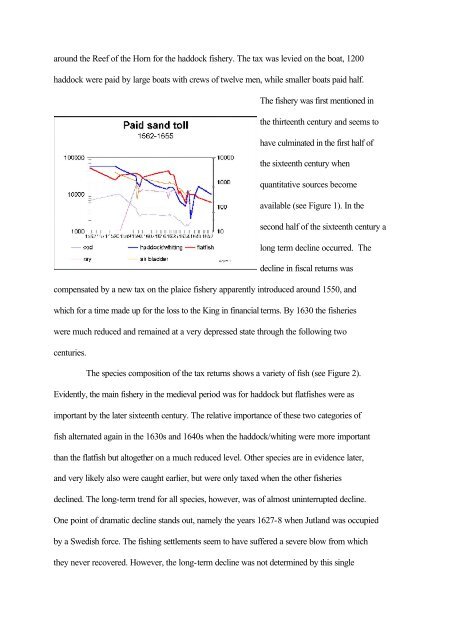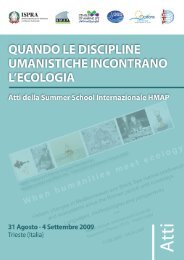The Danish fisheries c.1450-1800. Medieval and early modern ...
The Danish fisheries c.1450-1800. Medieval and early modern ...
The Danish fisheries c.1450-1800. Medieval and early modern ...
Create successful ePaper yourself
Turn your PDF publications into a flip-book with our unique Google optimized e-Paper software.
around the Reef of the Horn for the haddock fishery. <strong>The</strong> tax was levied on the boat, 1200<br />
haddock were paid by large boats with crews of twelve men, while smaller boats paid half.<br />
<strong>The</strong> fishery was first mentioned in<br />
the thirteenth century <strong>and</strong> seems to<br />
have culminated in the first half of<br />
the sixteenth century when<br />
quantitative sources become<br />
available (see Figure 1). In the<br />
second half of the sixteenth century a<br />
long term decline occurred. <strong>The</strong><br />
decline in fiscal returns was<br />
compensated by a new tax on the plaice fishery apparently introduced around 1550, <strong>and</strong><br />
which for a time made up for the loss to the King in financial terms. By 1630 the <strong>fisheries</strong><br />
were much reduced <strong>and</strong> remained at a very depressed state through the following two<br />
centuries.<br />
<strong>The</strong> species composition of the tax returns shows a variety of fish (see Figure 2).<br />
Evidently, the main fishery in the medieval period was for haddock but flatfishes were as<br />
important by the later sixteenth century. <strong>The</strong> relative importance of these two categories of<br />
fish alternated again in the 1630s <strong>and</strong> 1640s when the haddock/whiting were more important<br />
than the flatfish but altogether on a much reduced level. Other species are in evidence later,<br />
<strong>and</strong> very likely also were caught earlier, but were only taxed when the other <strong>fisheries</strong><br />
declined. <strong>The</strong> long-term trend for all species, however, was of almost uninterrupted decline.<br />
One point of dramatic decline st<strong>and</strong>s out, namely the years 1627-8 when Jutl<strong>and</strong> was occupied<br />
by a Swedish force. <strong>The</strong> fishing settlements seem to have suffered a severe blow from which<br />
they never recovered. However, the long-term decline was not determined by this single






